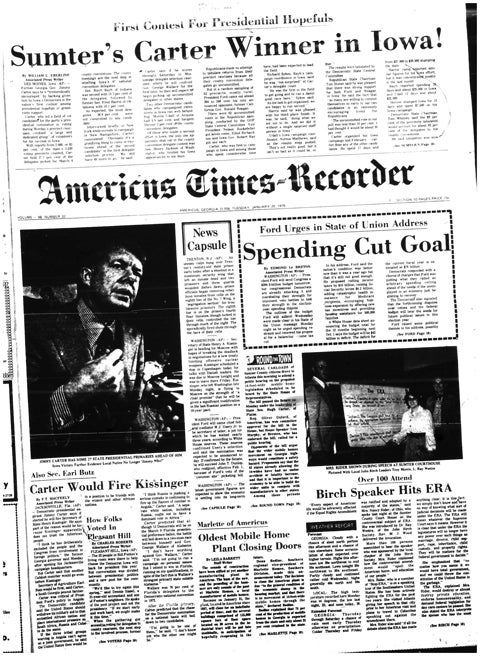It started in Iowa: Carter’s first win in 1976
Published 8:00 pm Tuesday, January 26, 2016
By D. JASON BERGGREN
Special to the Times-Recorder
www.americustimesrecorder.com
AMERICUS — To become president of the United States, one must win two presidential campaigns: winning a major party nomination and winning the general election. For Jimmy Carter, his road to the White House started with a victory in Iowa. It was his first of many victories on his way to the 1976 Democratic Party presidential nomination. Before Iowa, he was “Jimmy Who” — a virtual unknown. By winning the “first-in-the-nation” caucus, he was becoming “Jimmy Somebody” and a serious contender for the presidency.
On Jan. 19, 1976, Carter won greater support in the Iowa Caucus than any other Democratic candidate. He led the candidate field with 28 percent. Birch Bayh, U.S. senator from Indiana, was a distant second with 13 percent and Fred Harris, a former U.S. senator from Oklahoma, had 10 percent. Morris Udall, Sargent Shriver, and the other candidates were in single digits. As NBC News reported, Carter was all smiles.
Technically, most Iowa Democratic caucusgoers were “uncommitted” (37 percent) that night. But that was not the storyline of the subsequent state and national news reports. The prevailing storyline was this: “Jimmy Won!” The New York Times and Time magazine called it a “solid victory” and a “significant victory” for the former Georgia governor. According to Newsweek, Iowa moved Carter to “the forefront of presidential speculation.” It was “Jimmy Carter’s night,” wrote Jules Witcover of the Washington Post. Walter Cronkite of CBS News said, Iowa Democrats made their choice clear and it was for “Jimmy Carter.” Locally, across the top of the front page of the Americus Times-Recorder on Jan. 20 were the words, “Sumter’s Carter Winner in Iowa!” He exceeded expectations. Carter, Bayh, and Harris were expected to do well, but Carter’s double-digit margin was not.
Carter recognized the importance of grassroots organizing and getting voters to the caucus precincts. Political operative Tim Kraft directed his Iowa campaign. A 20-person steering committee was established to organize the state and recruit volunteers. Carter’s family campaigned across Iowa, too. By October 1975, the New York Times observed that the Carter campaign was making headway in Iowa. In an early test vote, Carter bested his rivals in a straw poll sponsored by the state’s main newspaper, the Des Moines Register. The straw poll was conducted at the Iowa Democratic Party’s Jefferson-Jackson Dinner in Ames.
When reaching out to voters, Carter possessed a warm personal touch. Beginning with his first campaign visit to the state in February 1975, he highlighted his agrarian, rural ties and spoke of moral values. He stressed the fact that unlike his opponents who served in the Congress, he was a fresh face, a non-lawyer, a farmer. He was “a working man” who pledged to tell the truth. This played well in Iowa. Many Americans were looking for something different; someone who was not a career, Washington insider.
Years later, Carter suggested that he may have been the original Tea Party candidate. In a 2010 opinion piece published in USA Today, he noted that there were “parallels between today’s frustrated and even angry mood and a similar mood in the mid-1970s. Indeed, in some ways my successful campaign for the presidency in 1976 resembled the Tea Party movement of today.”
Defying experts who believed his regional background was a liability as it had been for Alabama’s George Wallace in previous years, Carter proved that he could win outside the South. With a win in Iowa, he had the momentum going forward into the next primary states of New Hampshire, Florida, and beyond. He was the emerging Democratic frontrunner.
In the Jan. 21, 1976, edition of the Americus Times-Recorder, the editors reflected upon Carter’s Iowa performance. The following are excerpts from their editorial entitled, “Carter Surprises ‘Em.”
“Former Georgia Governor Jimmy Carter continues to win friends in places few candidates from Dixie have won friends for a hundred years. As a result, he’s fast becoming recognized as the surprise of the 1976 Democratic race.
“Carter’s latest outstanding accomplishment was his victory in the Iowa delegate selection precinct meetings Monday, in which he led receiving nearly one-third of the support. He more than doubled the percentage of his nearest rival for the delegates …
“Carter’s impressive beginning goes much further. He has demonstrated the ability to win over better known candidates … A number of pro observers are now convinced he’s the Democrat to beat … ”
Later in the year, on Aug. 24, 1976, in a speech to Iowa Democrats in Des Moines, Carter revisited and reflected upon the importance of his first win.
He said, “ … I came to Iowa to campaign. This is where my whole effort started … I remember the first reception we had in Des Moines. We rented a very large hotel ballroom, and we had enough food for several hundred people. And four people came. So I stood around embarrassed for a little while … But my campaign improved from there. We started off with nothing.
“I come from a little town … My wife and I and my children and a few volunteers began to go from one living room to another, and from one labor hall to another, and from one shopping center to another, and from one farmers’ market, livestock sales barn to another. And we made friends … And our campaign grew. And we got known … the major contributing factor to my own success was the confidence and the friendship and support that I got in the State of Iowa, and I will never forget it as long as I live. And I thank you for it.”
The win in the Iowa Caucus 40 years ago is an important part of the Carter presidential legacy. Each of his successors, Ronald Reagan, George H.W. Bush, Bill Clinton, George W. Bush, and Barack Obama, followed the Carter path to the presidency: compete in the early election contests, win either Iowa or New Hampshire, or both, win the first Southern primary, and then go on and compete everywhere across the country. Early wins create momentum generating greater enthusiasm, support, and news coverage. Eventually, after securing many more victories, a sense of inevitability arises.
Since 1976, Iowa has been an important first test of candidate viability. Although not every Democratic or Republican presidential nominee has won Iowa, few could afford to ignore it.
D. Jason Berggren is an associate professor of political science at Georgia Southwestern State University.






